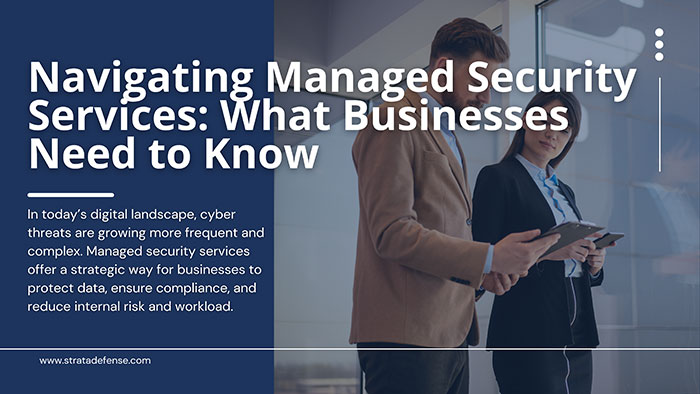
Cybersecurity threats are becoming more frequent and sophisticated in today's digital landscape. Businesses of all sizes must protect their sensitive data, maintain compliance with industry regulations, and mitigate security risks associated with network vulnerabilities. Managed security services provide organizations with a strategic approach to cybersecurity, helping them stay ahead of threats while reducing internal burdens.
Understanding how managed security services can benefit your organization is crucial to making informed security decisions. This guide will walk you through key aspects of managed security services, what to look for in a partner, and best practices for strengthening your business's security posture.
Protecting Data and Managing Compliance Burdens
Businesses handle sensitive data daily, including personally identifiable information (PII), protected health information (PHI), and intellectual property (IP). Ensuring this data is protected is not only a security imperative but also a compliance requirement in many industries. Managed security services can help organizations:
- Reduce the Risk of Data Breaches: Through continuous monitoring and proactive threat detection, businesses can identify vulnerabilities before they become major issues.
- Stay Compliant: Many industries, including healthcare and finance, have strict regulations regarding data security. MSS partners help ensure businesses meet compliance standards like HIPAA, GDPR, and PCI-DSS.
- Implement Proactive Security Strategies: Rather than reacting to security incidents after they happen, businesses can take a proactive approach by regularly assessing and improving their security posture.
Managing Cybersecurity Risks in a Changing Workplace
With the rise of remote work and digital transformation, businesses face new security challenges. Many organizations struggle with the following:
- Unsecured Devices and Networks: Remote work introduces new vulnerabilities as employees access company data from personal or unprotected devices.
- Delayed Security Patches: Failure to promptly update systems can expose businesses to known vulnerabilities.
- Inconsistent Security Practices: Without standardized security policies, businesses risk gaps in their defenses.
Strengthening Internal IT Teams with External Expertise
For organizations with in-house IT teams, managed security services do not replace internal resources—they enhance them. Many IT teams are stretched thin, balancing multiple responsibilities while trying to stay ahead of cybersecurity threats. Engaging with a managed security services partner can:
- Expand Security Coverage: Businesses can access advanced security tools and expertise without hiring additional team members.
- Enhance Incident Detection and Response: Around-the-clock monitoring and threat intelligence help organizations respond to threats more effectively.
- Support Scalability: As businesses grow, their security needs evolve. Managed security services provide the flexibility to scale security measures as needed.
Key Components of Effective Managed Security Services
Organizations considering managed security services should look for managed security services partners that provide comprehensive protection. Some essential features include:
- Custom Firewall Configuration: A well-configured firewall is essential for filtering malicious traffic and preventing unauthorized access. Businesses should ensure that their firewalls are customized to their specific network environment.
- Threat Intelligence and Monitoring: Cyber threats are constantly evolving. Continuous monitoring helps detect suspicious activity in real-time, allowing businesses to take immediate action.
- Regular Vulnerability Assessments: Conducting routine vulnerability assessments ensures businesses can identify and address security weaknesses before attackers exploit them.
- Secure Log Management: Log aggregation and analysis provide valuable insights into network activity. Consolidating log data helps businesses detect patterns, investigate incidents, and strengthen security policies.
- Compliance and Data Protection: Protecting sensitive information is a top priority. Businesses should implement tools that help locate and secure unprotected PII, PHI, and other critical data.
Taking a Proactive Approach to Security
As cybersecurity threats continue to grow, businesses must adopt a proactive approach to security. Managed security services provide organizations with the expertise, tools, and continuous monitoring needed to protect their networks, data, and customers.
By understanding the key components of managed security services and implementing best practices, businesses can make informed decisions about their cybersecurity strategies. Whether supplementing an internal IT team or outsourcing security entirely, a well-structured approach to managed security services ensures long-term protection and business continuity.
Secure Your Business with Expert Guidance
Cyber threats won't wait, and neither should your strategy. StrataDefense works as your partner to collaboratively approach solutions to help businesses stay ahead of evolving threats, maintain compliance, and secure critical assets. Let's discuss how we can strengthen your security posture. You can contact StrataDefense today to explore a managed security solution that fits your business needs.
